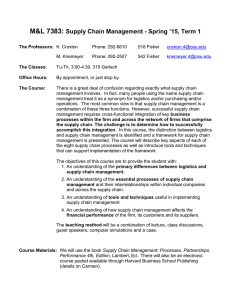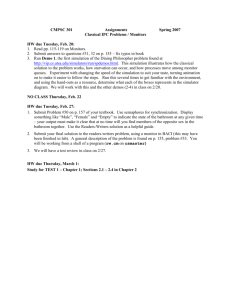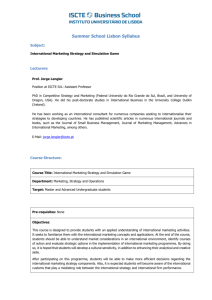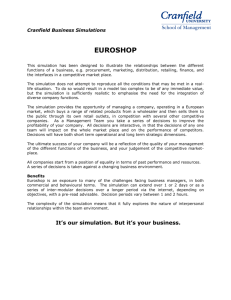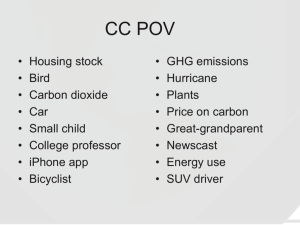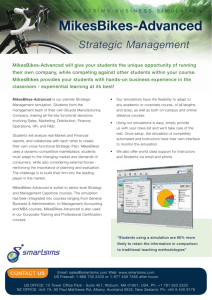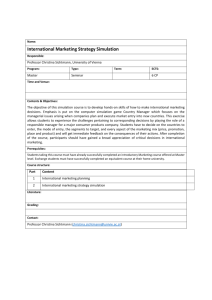4383 - Fisher College of Business
advertisement
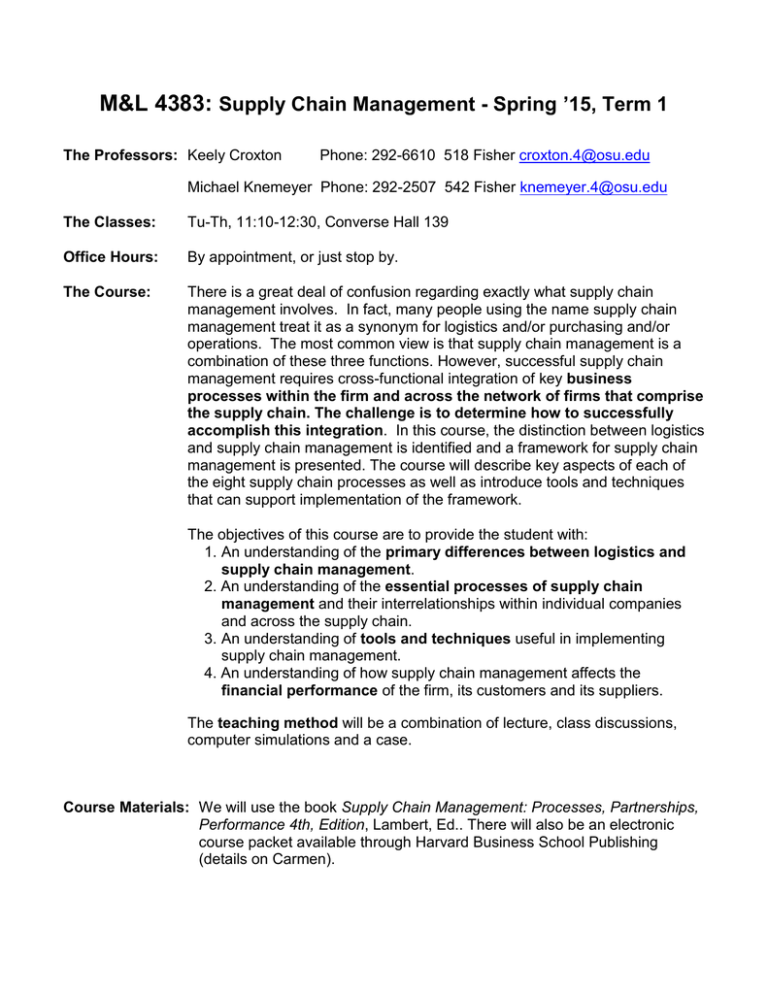
M&L 4383: Supply Chain Management - Spring ’15, Term 1 The Professors: Keely Croxton Phone: 292-6610 518 Fisher croxton.4@osu.edu Michael Knemeyer Phone: 292-2507 542 Fisher knemeyer.4@osu.edu The Classes: Tu-Th, 11:10-12:30, Converse Hall 139 Office Hours: By appointment, or just stop by. The Course: There is a great deal of confusion regarding exactly what supply chain management involves. In fact, many people using the name supply chain management treat it as a synonym for logistics and/or purchasing and/or operations. The most common view is that supply chain management is a combination of these three functions. However, successful supply chain management requires cross-functional integration of key business processes within the firm and across the network of firms that comprise the supply chain. The challenge is to determine how to successfully accomplish this integration. In this course, the distinction between logistics and supply chain management is identified and a framework for supply chain management is presented. The course will describe key aspects of each of the eight supply chain processes as well as introduce tools and techniques that can support implementation of the framework. The objectives of this course are to provide the student with: 1. An understanding of the primary differences between logistics and supply chain management. 2. An understanding of the essential processes of supply chain management and their interrelationships within individual companies and across the supply chain. 3. An understanding of tools and techniques useful in implementing supply chain management. 4. An understanding of how supply chain management affects the financial performance of the firm, its customers and its suppliers. The teaching method will be a combination of lecture, class discussions, computer simulations and a case. Course Materials: We will use the book Supply Chain Management: Processes, Partnerships, Performance 4th, Edition, Lambert, Ed.. There will also be an electronic course packet available through Harvard Business School Publishing (details on Carmen). The Grade: The final grade will be determined by the weighted average of the following: Quizzes (2 out of 3) Case Report Change Management Simulation Global Simulation Report Class Contribution Exam 20% (10% ea) 15% 10% 15% 10% 30% Class Quizzes: There will be three quizzes during the course of which two will count toward your course grade. Students who miss a quiz (for any reason including illnesses, schedule conflicts, tardiness, unscheduled vacations, etc.) during the class in which it is given will not be able to make it up afterwards. The lowest of the three quiz scores will be dropped for final grade calculation in order to provide students with some flexibility in the event of any conflicts that might cause them to miss one of the case quizzes during the session (or if they just happen to have a bad day). If you have any questions about this policy, please let us know. The quizzes will account for a total of 20% of your final grade. Case Report: Students will form teams (3 to 4 people) and complete one written case analysis (15%) during the course. Each student team will be responsible for writing up the analysis and solution to the assigned case. Guiding questions will be provided in Carmen. The write-up will be a report of case essentials, analysis and recommendations (no more than 8 pages – doublespaced, 12-point font, 1 inch margins). All students should be prepared to participate in the inclass case discussion. The case report will be due by the start of class on Thursday, February 5. Change Management Simulation: Students will individually complete a change management simulation during the course. Your performance on the simulation will account for 10% of your grade. More details of how your performance will be measured will be given at the time of the simulation. The simulation will be due by 5:00 pm Monday, February 23. Global Simulation Report: Student teams will complete a global supply chain simulation during the course. Each student team will submit a report that addresses the following questions in the appropriate CARMEN dropbox: a) How did your team think about which options to choose? b) What did your team use for your forecast? c) How did your team decide which suppliers to use? d) How did your team go about setting initial production levels? e) How did your team decide whether to issue production change orders? f) How did your team decide whether or not to invest in the Celldex show? g) What are your team’s takeaways from the simulation? The report should address each of these questions (no more than 10 pages – double-spaced, 12-point font, 1 inch margins). Additional details are provided in CARMEN regarding the expectations for this deliverable. The simulation report will account for 15% of your final grade. The simulation report will be due by the start of class on Thursday, February 12. Final Exam: The exam will be closed-book and closed-notes. Should you be sick on the exam day, you must contact the professor more than 8 hours before the exam and schedule a makeup exam that must be taken within 2 days. You will also need to provide a doctor’s note. Course Schedule*: DAY DATE Topic Reading Tu Jan 13 Course Overview and Intro to the Framework Both Chapter 1 Th Jan 15 Customer Relationship Management MK Chapter 2 Tu Jan 20 Supplier Relationship Management KC Chapter 3 Th Jan 22 Customer Service Management MK Chapter 4 Tu Jan 27 Order Fulfillment and Quiz 1 KC Chapter 5 Th Jan 29 Demand Management KC Chapter 6 Tu Feb 3 Manufacturing Flow Management and Lean Thinking MK Chapter 7, 12 Th Feb 5 Prod. Development & Commercialization and Medisys Case MK Chapter 8 Tu Feb 10 Returns Management and Quiz 2 KC Chapter 9 Th Feb 12 Global Supply Chain Management Simulation MK Tu Feb 17 The Partnership Model and Collaboration Framework MK Chapter 15 Th Feb 19 Process Assessments KC Chapter 13 Tu Feb 24 Implementation and Change Management KC Chapter 13 Th Feb 26 Comparison of Frameworks and Quiz 3 KC Chapter 18 TBD Exam MK * This schedule is subject to change
